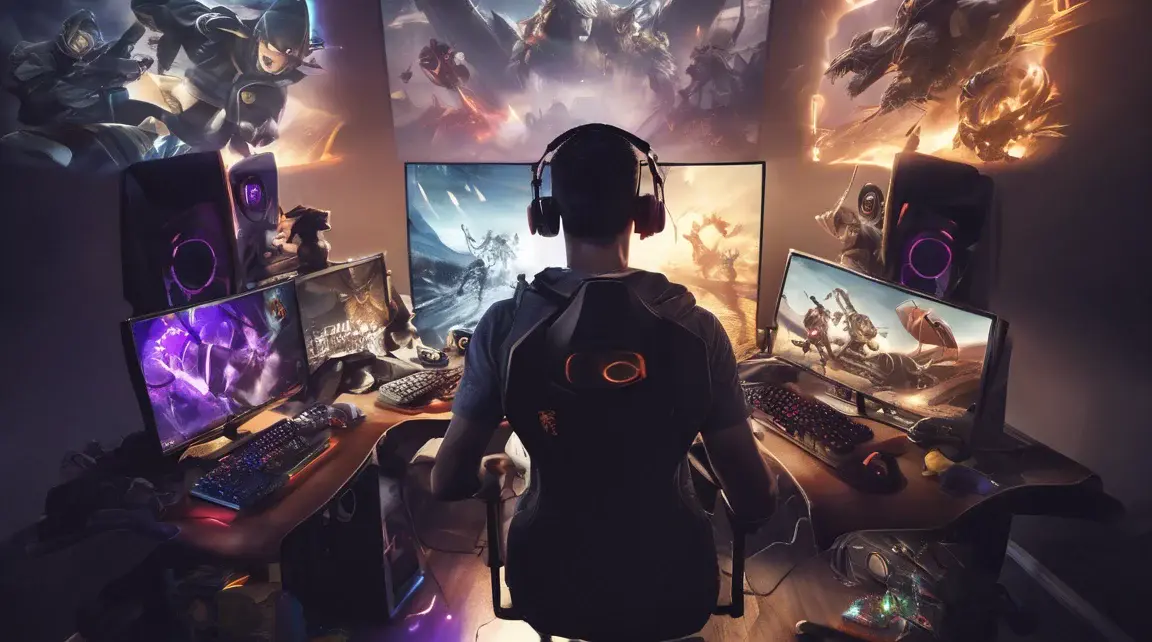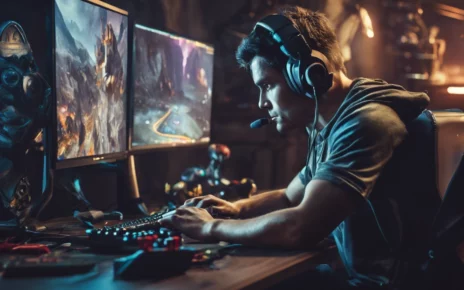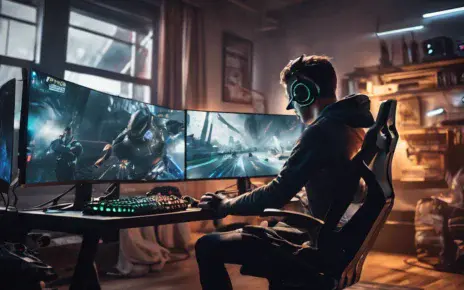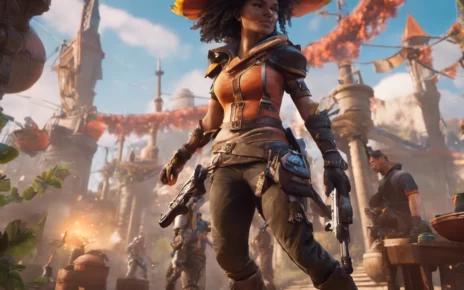Gaming is more than just button-mashing—it’s a complex blend of strategy, reflexes, and decision-making. To become a skilled player, you need to master essential gaming abilities such as hand-eye coordination, quick reflexes, strategic thinking, and teamwork. These skills form the foundation of gaming success, helping you transition from a casual player to an advanced competitor.
Why Gaming Skills Matter
Like any other discipline—be it sports or music—your gaming performance hinges on fundamental skills. Without these abilities, progressing beyond the beginner stage is challenging. Understanding game mechanics, reacting swiftly to in-game events, making quick decisions, and maintaining focus are all critical for improvement. Whether you’re into FPS, strategy, or RPG games, honing these core skills is essential.
The Key Components of Gaming Skills
Every game requires a different set of skills, but they all share common fundamentals:
- Hand-Eye Coordination: Essential for precise movements, especially in shooters and action games.
- Reflexes and Reaction Time: Fast decision-making and quick responses give you a competitive edge.
- Strategic Thinking: Whether you’re planning your next move in an RTS or setting up a perfect ambush in an FPS, strategic skills are crucial.
- Situational Awareness: Understanding your surroundings and anticipating enemy movements improves gameplay.
- Communication and Teamwork: Multiplayer games often require collaboration. Clear, effective communication can turn the tide of battle.
- Patience and Adaptability: Learning new mechanics and adjusting to different playstyles keeps you ahead of the competition.
The Psychology Behind Gaming Mastery
Gaming isn’t just a physical activity—it’s a mental challenge. Skill development requires training both your brain and hands. Understanding how you react under pressure, deal with losses, and stay motivated is crucial for long-term growth. Taking gaming as seriously as chess or professional sports can yield faster improvements. Managing frustration and channeling it into structured practice will help you progress efficiently.
- Handling Losses Effectively: Every defeat is a learning opportunity. Reviewing gameplay and pinpointing mistakes prevents repetitive errors.
- Staying Motivated: Setting milestones and tracking improvement helps maintain enthusiasm.
- Developing a Winning Mindset: Confidence and focus play a significant role in high-level gaming. Visualization techniques and goal-setting can enhance performance.
Assessing Your Current Skill Level
Before improving, you need to evaluate your current skillset. Conduct a self-assessment by asking:
- What are my strengths? (E.g., fast reflexes, sharp decision-making)
- Where do I struggle? (E.g., poor aim, weak strategic planning)
- How do I handle competition and pressure?
Once you’ve identified areas for improvement, set realistic goals. Instead of a vague objective like “I want to be a top player,” create a specific plan: “I will improve my aiming by practicing 30 minutes daily for a month.” Clear and measurable goals help track progress and maintain motivation.
Effective Practice Techniques
Practicing the right way is more effective than simply logging hours. Deliberate practice, where you focus on specific skills, leads to steady improvement.
- Targeted Training: Focus on particular areas needing improvement. If aiming is an issue, dedicate sessions to aim drills.
- Gaming Simulators: Tools like aim trainers and tactical simulators help refine skills without in-game distractions.
- Balanced Playtime: Mix structured practice with casual gaming to reinforce lessons while keeping the experience enjoyable.
- Skill Tracking: Keep a log of your progress, noting improvements and areas needing further attention.
- Muscle Memory Training: Repetition and consistent input can lead to more instinctive and precise movements in games.
- Game-Specific Drills: If you’re playing a game like “Call of Duty,” focusing on recoil control and crosshair placement can enhance your shooting mechanics.
Advanced Gaming Strategies for Competitive Play
Once the basics are mastered, advanced strategies give you an edge. High-level play requires strategic adaptability in addition to fast reflexes.
- Map Control & Positioning: Understanding maps and controlling key areas provides an advantage in shooters and strategy games.
- Resource Management: Managing in-game resources such as ammo, currency, and time is crucial.
- Opponent Analysis: Predicting enemy moves and countering strategies sets top players apart.
- Adaptability: Stay updated with game patches, balance changes, and meta shifts to maintain a competitive edge.
- Mind Games and Deception: Faking movements, baiting enemies, and strategic bluffs can force opponents into mistakes.
Since game updates often shift strategies, staying informed about patches and meta changes is crucial. Watching professional gamers on Twitch or YouTube also offers insights into advanced tactics.
Leveraging Technology for Skill Enhancement
Technology plays a significant role in improving gaming performance. Various tools help analyze gameplay and provide data-driven feedback:
- Performance Trackers: Software like Aim Lab and Overwolf tracks accuracy, reaction times, and movement.
- AI Coaching Platforms: Services like SenpAI and Mobalytics provide personalized training plans.
- Game Replays & Analysis: Reviewing past matches highlights mistakes and areas for improvement.
- Ergonomic Setup: A high-quality gaming chair, optimized monitor positioning, and responsive peripherals reduce fatigue and enhance performance.
- High Refresh Rate Monitors: Faster displays (144Hz or higher) improve reaction time and smoothness in competitive games.
- Custom Keybinds and Macros: Adjusting control layouts can enhance efficiency and comfort during gameplay.
A quality gaming setup also enhances performance. Investing in responsive peripherals—such as a gaming mouse, mechanical keyboard, and ergonomic chair—can significantly improve comfort and control, helping you perform at your best.
Building a Supportive Gaming Community
No player improves in isolation. Engaging with a community fosters growth and motivation.
- Join Gaming Groups: Online forums, Discord servers, and social media groups connect you with fellow gamers.
- Find a Mentor: Learning from experienced players speeds up improvement. Many pro gamers offer coaching services or mentorship programs.
- Engage in Team Play: Practicing with others fosters strategic thinking and communication skills.
- Follow Industry Experts: Keeping up with pro players and developers on platforms like Twitter, Reddit, and YouTube provides insights into new trends and strategies.
- Participate in Tournaments: Competing, even at a casual level, builds experience, improves skills, and helps gauge your progress against other players.
- Sharing Knowledge: Teaching others reinforces your own understanding of game mechanics and strategy.
A strong community makes gaming more enjoyable while keeping you motivated to refine your skills.
The Role of Physical and Mental Health in Gaming
While gaming is often viewed as a sedentary activity, maintaining physical and mental health is crucial for peak performance.
- Hand and Wrist Exercises: Prevents strain from prolonged gaming sessions.
- Eye Strain Reduction: Taking regular breaks and using blue light filters can reduce fatigue.
- Diet and Hydration: A healthy diet and proper hydration improve concentration and reaction times.
- Sleep Optimization: Quality sleep is essential for mental clarity and focus.
- Stress Management: Techniques like deep breathing and meditation help keep emotions in check during intense gaming moments.
Conclusion
Becoming a skilled gamer requires more than just time spent playing. It involves mastering game mechanics, practicing effectively, developing advanced strategies, and leveraging technology. Assessing your strengths and weaknesses, setting realistic goals, and engaging with a supportive community can accelerate your progress. Whether your goal is casual mastery or esports dominance, these strategies will help elevate your gaming skills to the next level. Remember, every top gamer started as a beginner—the key is persistence, smart practice, and a passion for improvement.




